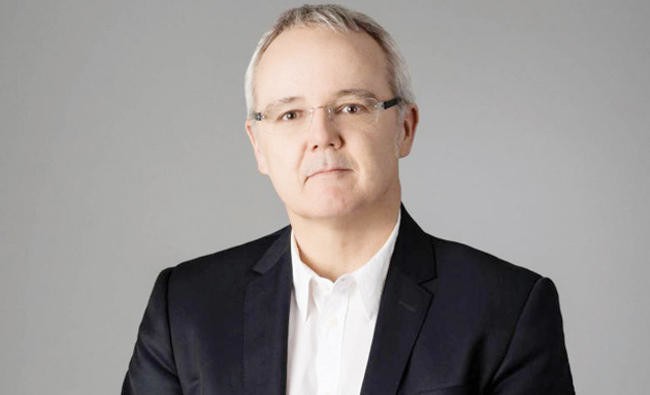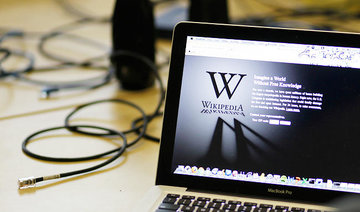LONDON: Wikipedia founder Jimmy Wales believes that the news is broken. Peter Bale and his founding team of six reporters want to fix it.
The New Zealand-born former Reuters reporter has been hired by Wales as the founding editor of WikiTribune, which will bring together professional journalists and a community of volunteers to collaborate on stories.
“The big leap journalistically is how to engage with that community and put them on an equal footing,” said the 54-year-old Bale, who hopes to launch the crowd-funded site later this year.
It also represents a big psychological leap for the paid journalists who are part of what will be a new way of producing stories.
WikiTribune aims to occupy the void of credibility left by the demise of traditional media and the rise of social media — which has become a conduit for content that often fails to reveal or inform, but in the words of Wales, merely confirms our own biases.
The rise of fake news inspired Wales to conceive of a new type of platform where professional journalists work alongside volunteer fact-checkers to break stories.
In a promotional video advertising the launch of WikiTribune, Wales laments the decline of the old gatekeepers of news — paid-for newspapers that employed reporters, editors and fact-checkers.
The era of the American broadcast journalist Walter Cronkite telling his trusting audience “that’s the way it is” is long gone.
We can no longer reliably turn to the news to tell us the way it is any more, some claim.
Wales believes social media has usurped that role and his latest venture is an attempt to wrestle back control.
He has slapped down the broad brush strokes of what WikiTribune will look like and it is now up to Bale and his fledgling team of reporters to apply the finer details.
Bale acknowledges that there is still much of that detail to work out and that his own understanding of how it is likely to function today may be very different from the reality a few months from now.
“One of the most important things is that we extract all the lessons from Wikipedia that are relevant to WikiTribune,” he said.
He already has a good sense of the themes that WikiTribune will tackle based on the polling of hundreds of people who have signed up to be part of the venture.
Subjects such as inequality, migration, and the rise of political Islam will all be within the orbit of the website.
“The stories we tackle are likely to be complex, to have multiple narratives running through them, to be stories that last within the news cycle more than 24 hours and that have underlying social and political factors,” Bale said.
Not everyone thinks it is a winning idea.
In an April 30 column headlined “Wikipedia won’t break real news, just tweak it,” Sunday Times deputy editor Sarah Baxter questioned the “wacky wisdom of self-appointed crowds” getting to the heart of the truth.
A piece by Emily Bell, the director of the Tow Center for Digital Journalism, and published in The Guardian on the same day, also questioned the value of the WikiTribune proposition.
“Digging in to the coverage of WikiTribune, there appears to be a high degree of skepticism that it will be a success, and even some suggestion that this type of approach is not only failing to ameliorate the current news environment, but is actually part of the problem,” she wrote.
Bale acknowledges that the website will occupy as-yet-uncharted media territory — but he also finds it hard to answer such criticism before it is up and running — largely because the detail of how it will function will only really become clear when it starts to publish stories and its reports start to interact with the wider community of volunteers.
“The proof will be in the pudding,” he said.
The tipping point for Jimmy Wales’ disenchantment with a broken news industry may have been Kellyanne Conway’s use of the phrase “alternative facts” during a “Meet the Press” interview in January.
She used the terms to defend the false claims made by the then White House press secretary Sean Spicer about attendance numbers at the inauguration of US President Donald Trump.
The phrase, which has been much lampooned since, quickly came to define the increasing unreliability of information being presented as fact. Alternative facts became the currency of the post-truth world.
WikiTribune hopes to tap into that growing sense of reader mistrust about the provenance of many stories circulated on social media.
“When you are building narratives based on alternative facts, you need organizations to hold you to account,” said Bale.
The website will be funded by donors so the more money it raises, the more journalists it can employ and the more stories it can take on. While supporters are being asked to pay £10 ($13) per month, access to the site is free. The idea is that without shareholders or advertisers there will be less commercial pressure to influence coverage. Supporters will be able to decide what is covered.
The stories themselves need to be based on verifiable information so reporters need to provide transcripts and recordings to back up their assertions. The public can also modify or update an article but only if approved by a member of staff or a trusted volunteer.
While fake news has been a defining aspect of the media landscape in recent years it is not the only one.
Bale sees the rise of commentary and the blurring of old lines that separated opinion from news as a significant and sometimes troubling development.
“There can be a lack of clarity between what is a piece of commentary and what is news,” he said.
“Commentary has been in the ascendancy for the last 15 years or so and some of it is superb.
“But the sweep of commentary is sometimes evidence-free, so we need to be much clearer about what is news and what is opinion.”
WikiTribune aims to launch by the end of the year — not much time to get a site that has such huge ambition off the ground.
Bale is both excited and daunted by the task.
In order for the vision of Jimmy Wales to become a reality it will need to scale up quickly. Both the structure and content of WikiTribune are likely to be complex.
But its driving force remains simple, according to Bale.
“There is a cliched but still apposite expression which is that ‘the purpose of journalism is to comfort the afflicted and afflict the comfortable’,” he said.
“It is about holding anyone in power to account.”
A Wiki way to fight fake news
A Wiki way to fight fake news

Google launches AI music model in English, Arabic

- Lyria 3 lets users generate 30-second audio tracks via Gemini
DUBAI: Google has launched Lyria 3, a generative AI music model currently in final testing, that can be used via the Gemini website and app to create customized audio tracks.
Users can provide text prompts such as “an upbeat, modern Arabic fusion track for Ramadan” or “a massive, anthemic rock song with an emotive male singer.”
They can add images to their prompts and ask the model to generate a track that reflects the ideas within the pictures. They can also add lyrics or ask the model to generate them.
Lyria 3 then produces a 30-second track along with cover art generated by Google’s artificial intelligence image generator and editor, Nano Banana.
Google said the aim was not to create a musical masterpiece or for copying existing artists but to let users express themselves in unique ways. However, if a prompt specifies a particular artist, the model can draw inspiration their style while still creating an original track.
Lyria was launched in 2023 and is the company’s most advanced music generation model. SynthID, Google’s tool to watermark and identify AI-generated content, is embedded in all tracks it creates.
Users can also upload a file to check whether it was generated using Google AI. Gemini will examine it for SynthID and provide a response based on its analysis.
Lyria 3 is available in Arabic, English, Spanish, French, Hindi, Japanese, Korean and Portuguese, with more languages expected in the future. It will be available on the mobile app in the coming days.













